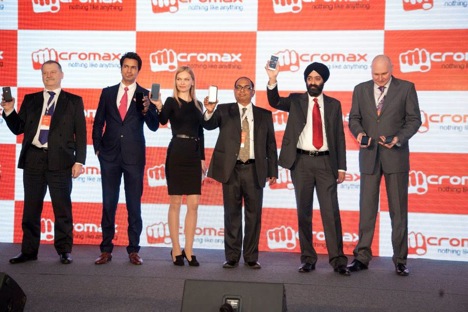'Two's company, three's a crowd', Sistema feels of RCOM deal

Sistema's further strategy in India will depend on the Indian telecom regulator’s position on spectrum trade and the M&A deal with RCOM. Source: Reuters/Vostock Photo
The deal to merge India's fourth-largest telecom operator Reliance Communications (RCOM) and Sistema Shyam TeleServices Ltd (SSTL), a joint venture of Russian Sistema JSFC and India’s Shyam Group, working in India under MTS brand, may be just a first round of a larger deal. According to a report in the Indian business daily Economic Times, the second phase of the deal could see RCOM entering a pact with another Indian service provider, Aircel, as both were reportedly exploring sharing and trading pacts for the five circles in which RCOM could not win 900 Mhz airwaves during the recent auctions.
The deal between three operators could see the emergence of India's third largest operator in the number of subscribers, the report said. Aircel's major stakeholder Maxis, a Malaysian communications service provider, may become the largest shareholder in the new company with a 35-40% stake, the Anil Ambani-owned Reliance Group could get less than 30 per cent and Russia's Sistema less than 10 per cent in the new telecom company.
“The Indian subsidiary of Sistema has no other change to grow into this market than to join hands with other operators. It seems to be the case when a small share in the merged company will be valued more than the whole asset before merger,” Timur Nigmatullin, financial analyst with Finam Holdings, told RIR.
When asked to comment on the involvement of a third party in the M&A deal, SSTL spokesperson told RIR that “while the merger talks between SSTL and RCom are a reality, to talk about inclusion of a third operator in such talks is not true”.
The news comes at the time when SSTL is going through a major change in its top management structure after Dmitry Shukov, its former chief executive, quit the company in September. Shukov joined Unitel, one of the largest cellular operators in Uzbekistan, acquired by the Russian VimpelCom in 2006.
Sergey Savchenko, who has been working with SSTL since 2008, took over as the new CEO and named Leonid Musatov as the company's chief commerce officer and Sandeep Yadav as its chief marketing and brand officer. Musatov earlier was chief marketing & brand officer and Yadav was executive director in charge of voice & data businesses. Elena Peretrukhina took over as Acting Chief Finance Officer of the company.
Merger benefits
Sistema JSFC officially announced that it had entered into exclusive discussions with Anil Ambani - owned Reliance Communications (RCOM) on a potential merger, through a stock swap in June, 2015.
“The discussions are indicative and non-binding in nature, and remain subject to due diligence, definitive documentation and approvals, as may be necessary. There is no certainty that any transaction will result,” the company said in a press statement. Several media reports earlier, in 2013, suggested Sistema was in talks with two other telecom operators, Tata Teleservices and Aircel.
A Mumbai-based telecom analyst who didn't want to be named said, for RCOM the deal with MTS, which is a CDMA operator, having spectrum holdings in the 800 MHz band is ideal for strengthening its 4G LTE focus. RCOM expects to launch 4G services on these airwaves by the end of 2015.
According to unaudited SSTL consolidated financial results for the second quarter, ending June 30th, 2015, the company’s consolidated revenues increased by 12 per cent to US$ 59.26 million, primarily from data revenue growth. SSTL non-voice revenues continued to demonstrate double-digit growth and increased by 13.4 per cent during the quarter, due to the company's data-centric approach. Non-voice revenues stood at over 55% of the company's quarterly revenues, the highest in the industry, according to the company.
SSTL reported that consolidated OIBDA (Operating Income Before Depreciation And Amortization) loss for the second quarter stood at US$ 8.6 million, making SSTL OIBDA positive in six of its nine operating circles including Delhi, Kolkata, West Bengal, Rajasthan, Karnataka and Tamil Nadu. OIBDA loss reduced by 58 per cent quarter on quarter because of increased data revenues, optimization of sales and marketing expenditure and reduction in interconnect charges during the quarter. The company’s net losses during the quarter, however, increased by 2.4 per cent during this period.
In an interview with the Russian newspaper Kommersant earlier this month, Mikhail Shamolin, President of Sistema JSFC, said stakeholders expect SSTL to reach a break-even by the end of 2015 in the remaining three operating circles. “We can reach such a situation by the end of this year, when we won't have to finance the company any more,” he said.
Sistema JSFC President earlier stated that company's further strategy in India will depend on the Indian telecom regulator’s position on spectrum trade and the M&A deal with RCOM.
“In my opinion, developments around the merger deal can benefit Sistema's plans concerning its telecom asset in India,” Nigmatullin said. “Although SSTL has a very low subscription base (its market share is not more than 1 per cent, according to industry regulator estimates) and not a bad spectrum holding, the company growth was very slow considering financial and operational results. The operator could not yet achieve a target of breaking even set by the management back in 2013,” he noted, adding that all these factors were overshadowed by SSTL's debt, which at the end of 30th June 2015, stood at INR 43.12 billion.
The Department of Telecom (DoT) released new norms for spectrum trading earlier this month, allowing telecom companies to trade spectrum, but not lease it to other companies. Trading will be permitted only on a pan-licensed service area. The clarifications in spectrum trading may benefit smaller telecom operators seeking entering merge deals with larger operators, such as SSTL,Videocon and others.
Sistema JSFC is the majority shareholder in SSTL with 56.68 per cent share. The other two shareholders are Shyam Group, with 24 per cent, and the Russian government, represented by Rosimushchestvo (the Federal Agency for State Property Management) with 17.14 per cent stake.
All rights reserved by Rossiyskaya Gazeta.
Subscribe
to our newsletter!
Get the week's best stories straight to your inbox
